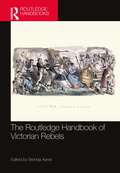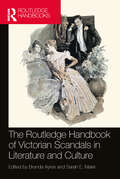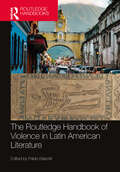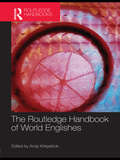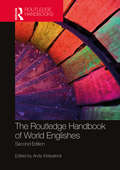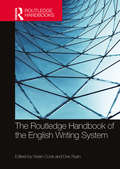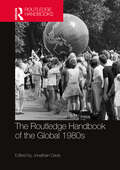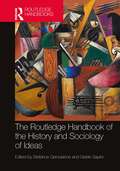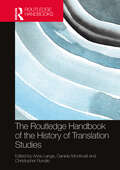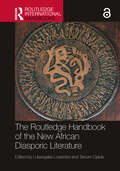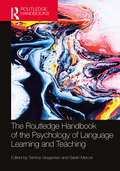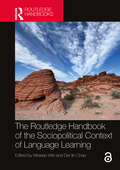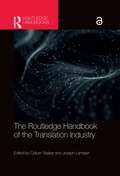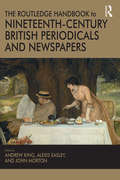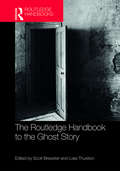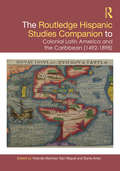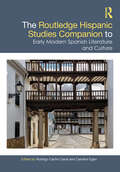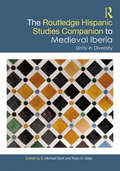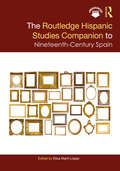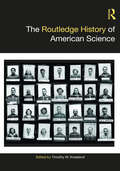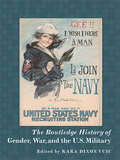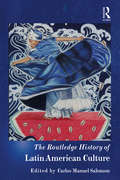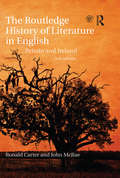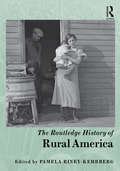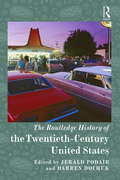- Table View
- List View
The Routledge Handbook of Victorian Rebels (Routledge Literature Handbooks)
by Ginger Frost Brenda Ayres Nick Freeman Anne Anderson Catherine J. Golden S. Brooke Cameron Daniel Stuart Julia Courtney Marshall Needleman Armintor’s Purna Banerjee Preeshita Biswas Lauren Nicole Cameron Sujata Chattopadhyay Clay Cogswell Julie Donovan Emily Dotson Aaron Eames Rachel M. Friars Scott Hayes Lindsay Katzir Catherine Layton Gail SavageAlthough history records that the British nineteenth century was obsessed with order,conventionality, and conformity, there were many Victorians from all walks of life, across lines of class, race, and gender, who resisted social mores and sometimes the laws themselves, in a variety of ways and to varying degrees. Some expressed dissension through music, art, literature, and social protest. Others were more subtle like manipulative wives who gained what they wanted while seemingly remaining docile and submissive. Some rebellion fermented into social and political movements. The revolt of still others was extremely executed by serial killers, criminals, and suicides. Contemporary readers can learn from these rebels and discern what values and ways that were uniquely Victorian should be retained and those that should be rejected after having observed their outcomes. To that end, this collection of essays offers a study for both novice and expert on Victorian rebels.
The Routledge Handbook of Victorian Scandals in Literature and Culture (Routledge Literature Handbooks)
by Brenda Ayres and Sarah E. MaierThe Routledge Handbook of Victorian Scandals in Literature and Culture exposes, explores, and examines what Victorians once considered flagrant breaches of decorum. Infringements that were fantasized through artforms or were actually committed exceeded entertaining parlor gossip; once in print they were condemned as socially contaminative but were also consumed as delightfully sensational. Written by scholars in diverse disciplines, this volume: Demonstrates that spreading scandals seemed to have been one of the most entertaining sources of activities but were also normative efforts made by the Victorians to ensure conformity of decorum. Provides a broad spectrum of infractions that were considered scandalous to the Victorians. Identifies Victorian transgressions that made the news and that may still shock modern readers. Covers a gamut of moral infractions and transgressions either practiced, rumored, or fantasized in art forms. This handbook is an invaluable resource about Victorian literature, art, and culture which challenges its readers to ponder perplexing questions about how and why some scandals were perpetrated and propagated in the nineteenth century while others were not, and what the controversies reveal about the human condition that persists beyond Victoria’s reign of propriety.
The Routledge Handbook of Violence in Latin American Literature (Routledge Literature Handbooks)
by Pablo BaisottiThis Handbook brings together essays from an impressive group of well-established and emerging scholars from all around the world, to show the many different types of violence that have plagued Latin America since the pre-Colombian era, and how each has been seen and characterized in literature and other cultural mediums ever since. This ambitious collection analyzes texts from some of the region's most tumultuous time periods, beginning with early violence that was predominately tribal and ideological in nature; to colonial and decolonial violence between colonizers and the native population; through to the political violence we have seen in the postmodern period, marked by dictatorship, guerrilla warfare, neoliberalism, as well as representations of violence caused by drug trafficking and migration. The volume provides readers with literary examples from across the centuries, showing not only how widespread the violence has been, but crucially how it has shaped the region and evolved over time.
The Routledge Handbook of World Englishes (Routledge Handbooks in Applied Linguistics)
by Andy KirkpatrickThe Routledge Handbook of World Englishes constitutes a comprehensive introduction to the study of World Englishes drawing on the expertise of leading authors within the field. The Handbook is structured in nine sections covering historical perspectives, core issues and topics and new debates which together provide a thorough overview of the field taking into account the new directions in which the discipline is heading. Among the key themes covered are the development of English as a lingua franca among speakers for whom English is a common but not first language, the parallel development of English as a medium of instruction in educational institutions throughout the world and the role of English as the international language of scholarship and scholarly publishing, as well as the development of ‘computer-mediated’ Englishes, including ‘cyberprose’. The Handbook also includes a substantial introduction and conclusion from the editor. The Routledge Handbook of World Englishes is the ideal resource for postgraduate students of applied linguistics as well as those in related degrees such as applied English language and TESOL/TEFL.
The Routledge Handbook of World Englishes (Routledge Handbooks in Applied Linguistics)
by Andy KirkpatrickThe Routledge Handbook of World Englishes constitutes a comprehensive introduction to the study of World Englishes. Split into six sections with 40 contributions, this Handbook discusses how English is operating in a wide range of fields from business to popular culture and from education to new literatures in English and its increasing role as an international lingua franca. Bringing together more than 40 of the world’s leading scholars in World Englishes, the sections cover historical perspectives, regional varieties of English from across the world, recent and emerging trends and the pedagogical implications and the future of Englishes. The Handbook provides a thorough and updated overview of the field, taking into account the new directions in which the discipline is heading. This second edition includes up-to-date descriptions of a wide range of varieties of English and how these reflect the cultures of their new users, including new chapters on varieties in Bangladesh, Uganda, the Maldives and South Africa, as well as covering hot topics such as translanguaging and English after Brexit. With a new substantial introduction from the editor, the Handbook is an ideal resource for students of applied linguistics, as well as those in related degrees such as applied English language and TESOL/TEFL.
The Routledge Handbook of the English Writing System (Routledge Handbooks in Linguistics)
by Vivian Cook Des RyanThe Routledge Handbook of the English Writing System provides a comprehensive account of the English writing system, both in its current iteration and highlighting the developing trends that will influence its future. Twenty-nine chapters written by specialists from around the world cover core linguistic and psychological aspects, and also include areas from other disciplines such as typography and computer-mediated communication. Divided into five parts, the volume encompasses a wide range of approaches and addresses issues in the following areas: theory and the English writing system, discussing the effects of etymology and phonology; the history of the English writing system from its earliest development, including spelling, pronunciation and typography; the acquisition and teaching of writing, with discussions of literacy issues and dyslexia; English writing in use around the world, both in the UK and America, and also across Europe and Japan; computer-mediated communication and developments in writing online and on social media. The Routledge Handbook of the English Writing System is essential reading for researchers and postgraduate students working in this area.
The Routledge Handbook of the Global 1980s
by Jonathan DavisThe 1980s was a decade of enormous global change. Upheaval from the top of governments to the bottom of societies saw a new world order begin to emerge. A new form of capitalism redefined global economics on both the right and left as market forces were unleashed. The ideological conflict of the previous four decades petered out as superpower relations improved. A more interconnected world introduced new consumer products and forms of popular culture to societies across the globe. And protest movements saw new battles fought and new alliances forged in an increasingly interdependent world.The Routledge Handbook of the Global 1980s brings together specialists from across the world to examine how the decade was shaped by these changes to politics, economics, culture, societies, and protest movements. The Handbook is divided into five parts focusing on the global environment, globalisation and neoliberalism, politics and society, culture and society, and the closing stages of the global Cold War.By taking an international approach to the history of the 1980s, this book offers a wide-ranging and important new perspective of this hugely transformative decade. It will appeal to students and scholars alike as well as all those interested in the political, social, economic, and cultural shifts of the 1980s.
The Routledge Handbook of the History and Sociology of Ideas
by Stefanos GeroulanosThe Routledge Handbook of the History and Sociology of Ideas establishes a new and comprehensive way of working in the history and sociology of ideas, in order to obviate several longstanding gaps that have prevented a fruitful interdisciplinary and international dialogues. Pushing global intellectual history forward, it uses methodological innovations in the history of concepts, gender history, imperial history, and history of normativity, many of which have emerged out of intellectual history in recent years, and it especially foregrounds the role of field theory for delimiting objects of study but also in studying transnational history and migration of persons and ideas. The chapters also explore how intellectual history crosses the study of particular domains: law, politics, economy, science, life sciences, social and human sciences, book history, literature, and emotions.
The Routledge Handbook of the History of Translation Studies (Routledge Handbooks in Translation and Interpreting Studies)
by Christopher Rundle Anne Lange Daniele MonticelliThe Routledge Handbook of the History of Translation Studies is an exploration of the history of translation and interpreting studies (TIS) as a field of intellectual enquiry. The volume covers the evolution of thinking on translation, from the earliest discourses in Assyria, Egypt, Israel, China, India, Greece, and Rome, up to the early 20th century when TIS emerged as an identifiable academic field. The volume also traces the institutionalization of TIS and its key concepts from their beginnings in the 1920s in Ukraine up to their contemporary interdisciplinary manifestations. Written by leading international scholars, many of whom played a direct role in the events they describe, the chapters in this volume provide a comprehensive and in-depth account of the birth and consolidation of translation and interpreting studies as a thriving interdiscipline. With a focus on providing readers with the methodological and theoretical tools they need to conduct research, as well as background in the historiography of TIS, this handbook is an indispensable resource for all students and researchers of translation and interpreting studies.
The Routledge Handbook of the New African Diasporic Literature (Routledge International Handbooks)
by Tanure Ojaide Lokangaka LosambeThe Routledge Handbook of the New African Diasporic Literature introduces world literature readers to the transnational, multivocal writings of immigrant African authors. Covering works produced in Europe, North America, and elsewhere in the world, this book investigates three major aesthetic paradigms in African diasporic literature: the Sankofan wave (late 1960s–early 1990s); the Janusian wave (1990s–2020s); and the Offshoots of the New Arrivants (those born and growing up outside Africa).Written by well-established and emerging scholars of African and diasporic literatures from across the world, the chapters in the book cover the works of well-known and not-so-well-known Anglophone, Francophone, and Lusophone writers from different theoretical positionalities and critical approaches, pointing out the unique innovative artistic qualities of this major subgenre of African literature. The focus on the “diasporic consciousness” of the writers and their works sets this handbook apart from others that solely emphasize migration, which is more of a process than the community of settled African people involved in the dynamic acts of living reflected in diasporic writings.This book will appeal to researchers and students from across the fields of Literature, Diaspora Studies, African Studies, Migration Studies, and Postcolonial Studies.
The Routledge Handbook of the Psychology of Language Learning and Teaching (Routledge Handbooks in Applied Linguistics)
by Tammy Gregersen Sarah MercerThis state-of-the-art volume is the first to capture a hybrid discipline that studies the role and linguistic implications of the human mind in language learning and teaching. This Handbook considers individual as well as collective factors in language learners and teachers from an array of new empirical constructs and theoretical perspectives, including implications for practice and “myths, debates, and disagreements” in the field, and points to future directions for research. This collection of stellar contributions is an essential resource for researchers, advanced students, and teachers working in applied linguistics, second language acquisition, psychology, and education.
The Routledge Handbook of the Sociopolitical Context of Language Learning (Routledge Handbooks of Language Learning in the Global Context)
by Der-Lin Chao Weixiao WeiThe Routledge Handbook of the Sociopolitical Context of Language Learning is a compelling examination of how language education must adapt to our rapidly changing world. This book explores the need for a fresh perspective on language learning, moving beyond traditional methods to address the complexities of today’s global landscape. It delves into the impact of geopolitical shifts, cultural exchanges, and social justice issues on language education.The book offers a blend of theoretical insights and practical approaches, highlighting how language learning intersects with global politics and cultural diversity. It examines case studies from various countries, including Ukraine and Oman, to reveal how language policies and practices are evolving in response to contemporary challenges. By integrating themes of identity, equity, and intercultural understanding, the book presents groundbreaking content that pushes for more inclusive and effective language education.Ideal for educators, policymakers, and anyone interested in the future of language learning, this book provides valuable perspectives on how to rethink and redesign language education to better serve a diverse and interconnected world. It offers practical strategies and thought-provoking analyses, making it an essential resource for navigating the complexities of modern language teaching and learning.Chapter 1 of this book is freely available as a downloadable Open Access PDF at http://www.taylorfrancis.com under a Creative Commons Attribution-Non Commercial-No Derivatives (CC BY-NC-ND) 4.0 license.Chapter 19 of this book is freely available as a downloadable Open Access PDF at http://www.taylorfrancis.com under a Creative Commons Attribution-Non Commercial-No Derivatives (CC BY-NC-ND) 4.0 license.
The Routledge Handbook of the Translation Industry (Routledge Handbooks in Translation and Interpreting Studies)
by Joseph Lambert Callum WalkerThe Routledge Handbook of the Translation Industry provides an accessible and comprehensive overview of current and emerging practices, workflows, and processes in the translation industry, the professional and socio-economic contexts in which industry actors operate, and best practices in translation industry teaching and research in this rapidly developing field.Comprising 33 chapters from scholarly and industry voices, this handbook addresses the many issues arising from growing technologisation, new trends in translation procurement and production, and increasing pressures on the range of actors in the translation industry. The content spans both bottom-up and top-down perspectives, using a variety of theoretical, praxiological, and data-driven approaches.In addition to providing coverage of a range of well-established professional profiles, workflows, and resources, this handbook adopts a novel approach in addressing emerging topics such as global sustainable development and wellbeing, economics, the platform economy, and social media and the influencer economy. The opening mapping chapter and final roundtable chapter provide fitting conceptual and forward-looking bookends for the content.This handbook offers a topical and much-needed forum to engage with the challenges and opportunities facing the translation industry and constitutes an essential point of reference for students and researchers of translation as well as industry practitioners and professionals.
The Routledge Handbook to Nineteenth-Century British Periodicals and Newspapers
by John Morton Andrew King Alexis EasleyProviding a comprehensive, interdisciplinary examination of scholarship on nineteenth-century British periodicals, this volume surveys the current state of research and offers researchers an in-depth examination of contemporary methodologies. The impact of digital media and archives on the field informs all discussions of the print archive. Contributors illustrate their arguments with examples and contextualize their topics within broader areas of study, while also reflecting on how the study of periodicals may evolve in the future. The Handbook will serve as a valuable resource for scholars and students of nineteenth-century culture who are interested in issues of cultural formation, transformation, and transmission in a developing industrial and globalizing age, as well as those whose research focuses on the bibliographical and the micro case study. In addition to rendering a comprehensive review and critique of current research on nineteenth-century British periodicals, the Handbook suggests new avenues for research in the twenty-first century.
The Routledge Handbook to the Ghost Story (Routledge Literature Handbooks)
by Luke Thurston Scott BrewsterThe Handbook to the Ghost Story sets out to survey and significantly extend a new field of criticism which has been taking shape over recent years, centring on the ghost story and bringing together a vast range of interpretive methods and theoretical perspectives. The main task of the volume is to properly situate the genre within historical and contemporary literary cultures across the globe, and to explore its significance within wider literary contexts as well as those of the supernatural. The Handbook offers the most significant contribution to this new critical field to date, assembling some of its leading scholars to examine the key contexts and issues required for understanding the emergence and development of the ghost story.
The Routledge Hispanic Studies Companion to Colonial Latin America and the Caribbean (Routledge Companions to Hispanic and Latin American Studies)
by Yolanda Martínez-San Miguel Santa AriasThe Routledge Hispanic Studies Companion to Colonial Latin America and the Caribbean (1492-1898) brings together an international team of scholars to explore new interdisciplinary and comparative approaches for the study of colonialism. Using four overarching themes, the volume examines a wide array of critical issues, key texts, and figures that demonstrate the significance of Colonial Latin America and the Caribbean across national and regional traditions and historical periods. This invaluable resource will be of interest to students and scholars of Spanish and Latin American studies examining colonial Caribbean and Latin America at the intersection of cultural and historical studies; transatlantic, postcolonial and decolonial studies; and critical approaches to archives and materiality. This timely volume assesses the impact and legacy of colonialism and coloniality.
The Routledge Hispanic Studies Companion to Early Modern Spanish Literature and Culture (Routledge Companions to Hispanic and Latin American Studies)
by Javier Muñoz-Basols Rodrigo Cacho Casal Caroline EganThe Routledge Hispanic Studies Companion to Early Modern Spanish Literature and Culture introduces the intellectual and artistic breadth of early modern Spain from a range of disciplinary and critical perspectives. Spanning the sixteenth and seventeenth centuries (a period traditionally known as the Golden Age), the volume examines topics including political and scientific culture, literary and artistic innovations, and religious and social identities and institutions in transformation. The 36 chapters of the volume include both expert overviews of key topics and figures from the period as well as new approaches to understudied questions and materials. This invaluable resource will be of interest to advanced students and scholars in Hispanic studies, as well as Renaissance and early modern studies more generally.
The Routledge Hispanic Studies Companion to Medieval Iberia: Unity in Diversity (Routledge Companions to Hispanic and Latin American Studies)
by E. Michael Gerli and Ryan D. GilesThe Routledge Hispanic Studies Companion to Medieval Iberia: Unity in Diversity draws together the innovative work of renowned scholars as well as several thought-provoking essays from emergent academics, in order to provide broad-range, in-depth coverage of the major aspects of the Iberian medieval world. Exploring the social, political, cultural, religious, and economic history of the Iberian Peninsula, the volume includes 37 original essays grouped around fundamental themes such as Languages and Literatures, Spiritualities, and Visual Culture. This interdisciplinary volume is an excellent introduction and reference work for students and scholars in Iberian Studies and Medieval Studies. SERIES EDITOR: BRAD EPPS SPANISH LIST ADVISOR: JAVIER MUÑOZ-BASOLS
The Routledge Hispanic Studies Companion to Nineteenth-Century Spain (Routledge Companions to Hispanic and Latin American Studies)
by Elisa Martí-LópezThe Routledge Hispanic Studies Companion to Nineteenth-Century Spain brings together an international team of expert contributors in this critical and innovative volume that redefines nineteenth-century Spain in a multi-national, multi-lingual, and transnational way. This interdisciplinary volume examines questions moving beyond the traditional concept of Spain as a singular, homogenous entity to a new understanding of Spain as an unstable set of multipolar and multilinguistic relations that can be inscribed in different translational ways. This invaluable resource will be of interest to advanced students and scholars in Hispanic Studies.
The Routledge History of American Science (Routledge Histories)
by Timothy W. KneelandThe Routledge History of American Science provides an essential companion to the most significant themes within the subject area. The field of the history of science continues to grow and expand into new areas and to adopt new theories to explain the role of science and its connections to politics, economics, religion, social structures, intellectual history, and art. This book takes North America as its focus and explores the history of science in the region both nationally and internationally with 27 chapters from a range of disciplines. Part I takes a chronological look at the history of science in America, from its origins in the Atlantic World, through to the American Revolution, the Civil War, the World Wars, and ending in the postmodern era. Part II discusses American science in practice, from scientists as practitioners, laboratories and field experiences, to science and religion. Part III examines the relationship between science and power. The chapters touch on the intersection of science and imperialism, environmental science in U.S. politics, as well as capitalism and science. Finally, Part IV explores how science is embedded in the culture of the United States with topics such as the growing importance of climate science, the role of scientific racism, the construction of gender, and how science and disability studies converge. The final chapter reviews the way in which society has embraced or rejected science, with reflections on the recent pandemic and what it may mean for the future of American science. This book fills a much-needed gap in the history and historiography of American science studies and will be an invaluable guide for any student or researcher in the history of science in America.
The Routledge History of Gender, War, and the U.S. Military (Routledge Histories)
by Kara D. VuicThe Routledge History of Gender, War, and the U.S. Military is the first examination of the interdisciplinary, intersecting fields of gender studies and the history of the United States military. In twenty-one original essays, the contributors tackle themes including gendering the "other," gender and war disability, gender and sexual violence, gender and American foreign relations, and veterans and soldiers in the public imagination, and lay out a chronological examination of gender and America’s wars from the American Revolution to Iraq. This important collection is essential reading for all those interested in how the military has influenced America's views and experiences of gender.
The Routledge History of Latin American Culture (Routledge Histories)
by Carlos Manuel SalomonThe Routledge History of Latin American Culture delves into the cultural history of Latin America from the end of the colonial period to the twentieth century, focusing on the formation of national, racial, and ethnic identity, the culture of resistance, the effects of Eurocentrism, and the process of cultural hybridity to show how the people of Latin America have participated in the making of their own history. The selections from an interdisciplinary group of scholars range widely across the geographic spectrum of the Latin American world and forms of cultural production. Exploring the means and meanings of cultural production, the essays illustrate the myriad ways in which cultural output illuminates political and social themes in Latin American history. From religion to food, from political resistance to artistic representation, this handbook showcases the work of scholars from the forefront of Latin American cultural history, creating an essential reference volume for any scholar of modern Latin America.
The Routledge History of Literature in English: Britain and Ireland
by Ronald Carter John McRaeThe Routledge History of Literature in English covers the main developments in the history of British and Irish literature, with accompanying language notes which explore the interrelationships between language and literature at each stage. With a span from AD 600 to the present day, it emphasises the growth of literary writing, its traditions, conventions and changing characteristics, and includes literature from the margins, both geographical and cultural. Extensive quotations from poetry, prose and drama underpin the narrative. The third edition covers recent developments in literary and cultural theory, and features: a new chapter on novels, drama and poetry in the 21st century; examples of analysis of key texts drawn from across the history of British and Irish literature, including material from Chaucer, Shakespeare, John Keats and Virginia Woolf; an extensive companion website including extra language notes and key text analysis; lists of Booker, Costa and Nobel literature prize winners; and an A-Z of authors and topics. The Routledge History of Literature in English is an invaluable reference for any student of English literature and language.
The Routledge History of Rural America (Routledge Histories Ser.)
by Pamela Riney-KehrbergThe Routledge History of Rural America charts the course of rural life in the United States, raising questions about what makes a place rural and how rural places have shaped the history of the nation. Bringing together leading scholars to analyze a wide array of themes in rural history and culture, this text is a state-of-the-art resource for students, scholars, and educators at all levels. This Routledge History provides a regional context for understanding change in rural communities across America and examines a number of areas where the history of rural people has deviated from the American mainstream. Readers will come away with an enhanced understanding of the interplay between urban and rural areas, a knowledge of the regional differences within the rural United States, and an awareness of the importance of agriculture and rural life to American society. The book is divided into four main sections: regions of rural America, rural lives in context, change and development, and resources for scholars and teachers. Examining the essays on the regions of rural America, readers can discover what makes New England different from the South, and why the Midwest and Mountain West are quite different places. The chapters on rural lives provide an entrée into the social and cultural history of rural peoples – women, children and men – as well as a description of some of the forces shaping rural communities, such as immigration, race and religious difference. Chapters on change and development examine the forces molding the countryside, such as rural-urban tensions, technological change and increasing globalization. The final section will help scholars and educators integrate rural history into their research, writing, and classrooms. By breaking the field of rural history into so many pieces, this volume adds depth and complexity to the history of the United States, shedding light on an understudied aspect of the American mythology and beliefs about the American dream.
The Routledge History of Twentieth-Century United States (Routledge Histories Ser.)
by Jerald Podair Darren DochukThe Routledge History of the Twentieth-Century United States is a comprehensive introduction to the most important trends and developments in the study of modern United States history. Driven by interdisciplinary scholarship, the thirty-four original chapters underscore the vast range of identities, perspectives and tensions that contributed to the growth and contested meanings of the United States in the twentieth century. The chronological and topical breadth of the collection highlights critical political and economic developments of the century while also drawing attention to relatively recent areas of research, including borderlands, technology and disability studies. Dynamic and flexible in its possible applications, The Routledge History of the Twentieth-Century United States offers an exciting new resource for the study of modern American history.
